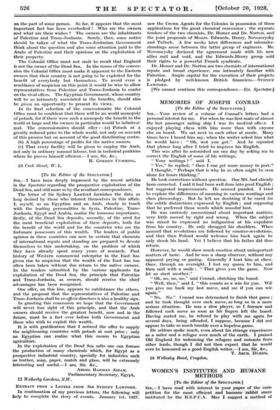[To the Editor of the SPECTATOR.]
have been deeply impressed by the recent articles in the Spectator regarding the prospective exploitation of the Dead Sea, and still more so by the resultant correspondence.
The letter of Sir Sydney Lawford furnishes the data so long desired by those who interest themselves in this affair. I, myself, as an Egyptian and an Arab, closely in touch with the leading personalities in Syria, Palestine, Trans- Jordania, Egypt and Arabia, realize the immense importance, firstly, of the Dead Sea deposits, secondly, of the need for the most beneficial exploitation of these deposits, both for the benefit of the world and for the countries who are the fortunate possessors of this wealth. The leaders of public opinion in these countries can now be certain that chemists of international repute and standing are prepared to devote themselves to this undertaking, on the problem of which they have already spent many years of research. Past history of Western commercial enterprise in the East has given rise to suspicion that the wealth of the East has too often been taken without due return to the native owners. In the tenders submitted by the various applicants for exploitation of the Dead Sea, the principle that Palestine and Trans-Jordania, as owners, should receive the chief advantages has been recognized.
One offer, on this line, appears to outdistance the others, and the proposal that the representatives of Palestine and Trans-Jordania shall be ex-officio directors is also a healthy sign.
In granting this concession we hope that the Government will never lose sight of this principle, and that. the Arab owners should receive the greatest benefit, now and in the future, must be a fact ever before both Government and those who wish to exploit this wealth.
It is with gratification that I noticed the offer to supply the neighbouring countries with potash at cost price ; only an Egyptian can realize what this means to Egyptian agriculture.
In the exploitation of the Dead Sea salts one can foresee the production of many chemicals which, for Egypt as a prospective_ industrial country, specially for industries such as leather, soap, paper, match and glass, will be extremely interesting and useful.—I am, Sir, &c.,
ABDEL RAHMAN AZZAM, Parliamentary Secretary, Egypt. i5 Wetherby Gardens, S.W.
EXTRACT PROM A LETTER FROM SIR SYDNEY LAWFORD. In continuation of my previous letters; the following will help to complete the story of events. January 1st. 1927. saw. the Crown Agents for the Colonies in possession of three applications for the great chemical concession ; the separate tenders of the two chemists, Dr. Homer and Dr. Norton, and the joint proposals of Messrs. Edwards, Henry, Novomeysky and Tulloch. A few weeks later differences and misunder- standings arose between the latter group of engineers. Mr. Novomeysky declared the agreement made with his new allies null and void, and the Edwards-Henry group sold their rights to a powerful French syndicate.
Dr. Homer and Dr. Norton are two chemists of international repute and broad experience, one intimately familiar with Palestine. Ample capital for the execution of their projects is pledged by well-known British financiers.--SvoNEv LAWFORD.
[We cannot continue this correspondence.—ED. Spectator.]






























































 Previous page
Previous page